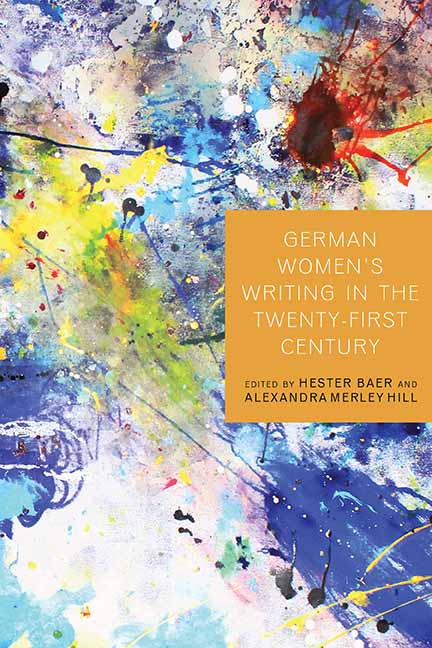Book contents
- Frontmatter
- Dedication
- Contents
- Acknowledgments
- Introduction: German Women’s Writing Beyond the Gender Binary
- 1 Language-Bodies: Interpellation and Gender Transition in Antje Rávic Strubel’s Kältere Schichten der Luft and Judith Hermann’s “Sonja”
- 2 Matrilineal Narrative and the Feminist Family Romance
- 3 The Pitfalls of Constructing a Female Genealogy: Cultural Memory of National Socialism in Recent Family Narratives
- 4 Reckoning with God: Attitudes toward Religion in German-Language Women’s Writing in the Twenty-First Century
- 5 Muslim Writing, Women’s Writing
- 6 Popfeminism, Ethnicity, and Race in Contemporary Germany: Hatice Akyün’s Popfeminist Autobiographic Works Einmal Hans mit scharfer Soße (2005) and Ali zum Dessert (2008)
- 7 The Awkward Politics of Popfeminist Literary Events: Helene Hegemann, Charlotte Roche, and Lady Bitch Ray
- 8 The Indictment of Neoliberalism and Communism in the Novels of Katharina Hacker, Nikola Richter, Judith Schalansky, and Julia Schoch
- 9 Sounds of Silence: Rape and Representation in Juli Zeh’s Bosnian Travelogue
- Bibliography
- Notes on the Contributors
- Index
2 - Matrilineal Narrative and the Feminist Family Romance
Published online by Cambridge University Press: 25 May 2021
- Frontmatter
- Dedication
- Contents
- Acknowledgments
- Introduction: German Women’s Writing Beyond the Gender Binary
- 1 Language-Bodies: Interpellation and Gender Transition in Antje Rávic Strubel’s Kältere Schichten der Luft and Judith Hermann’s “Sonja”
- 2 Matrilineal Narrative and the Feminist Family Romance
- 3 The Pitfalls of Constructing a Female Genealogy: Cultural Memory of National Socialism in Recent Family Narratives
- 4 Reckoning with God: Attitudes toward Religion in German-Language Women’s Writing in the Twenty-First Century
- 5 Muslim Writing, Women’s Writing
- 6 Popfeminism, Ethnicity, and Race in Contemporary Germany: Hatice Akyün’s Popfeminist Autobiographic Works Einmal Hans mit scharfer Soße (2005) and Ali zum Dessert (2008)
- 7 The Awkward Politics of Popfeminist Literary Events: Helene Hegemann, Charlotte Roche, and Lady Bitch Ray
- 8 The Indictment of Neoliberalism and Communism in the Novels of Katharina Hacker, Nikola Richter, Judith Schalansky, and Julia Schoch
- 9 Sounds of Silence: Rape and Representation in Juli Zeh’s Bosnian Travelogue
- Bibliography
- Notes on the Contributors
- Index
Summary
RECENT YEARS HAVE SEEN the publication in Germany of a vast number and array of multigenerational family narratives that look back to the turbulent history of the twentieth century. They look in particular to the family stories that are passed on from one generation to the next as a way of understanding and representing the past, and they also explore those that are kept secret or hidden from view and yet contribute to shaping the present. These narratives use the family as a prism through which to explore the residual impact of the historical events of the twentieth century, and in particular what Anne Fuchs has called the “agitated legacy” of the Second World War, as well as the concerns of contemporary society. The fact that many such family novels have achieved commercial as well as critical success suggests that this genre is one that has secured its place on the German literary scene.
A particular concern with contemporary German family narratives is that they tend to be written from the point of view of the third postwar generation, a generation that has no firsthand experience of the war and is therefore inevitably dependent on the accounts of others for knowledge and understanding. Harald Welzer, Sabine Moller, and Karoline Tschuggnall have pointed to the discrepancies that can often emerge between what they term the “Lexikon” of objective, public knowledge about the National Socialist past and the subjective, private “Album” of stories and memories that are passed down through the family; this generation's understanding of past events is often based on secondhand knowledge gleaned from a number of different and often contradictory sources.
The difficulties involved in piecing together the fragments of the family narrative, as well as the broader historical narrative, are often thematized in these texts themselves. Friederike Eigler points to the prevalence in contemporary German literature of generational novels, which she defines as “Romane, in denen Familiengeschichte erforscht oder mühsam rekonstruiert wird” (novels in which family history is examined or carefully reconstructed).These generational novels do not confine themselves to merely telling the stories of various generations of a family but rather emphasize the constructive element that is an inevitable part of the process of reconstruction.
- Type
- Chapter
- Information
- German Women's Writing in the Twenty-First Century , pp. 37 - 53Publisher: Boydell & BrewerPrint publication year: 2015

